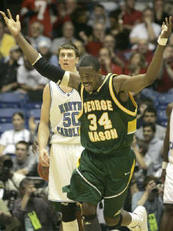The WAGER Vol. 11(3) – Need for More Research Before Going “Mad” Over March Madness
According to the FBI, several million Americans illegally will bet an estimated $2.4 billion on the annual NCAA Division I basketball tournament, more commonly known as "March Madness" this month (Harrop, 2006). Las Vegas’ casinos are expected to make about $90 million from March Madness this year (Harrop, 2006). Wagering on the basketball tournament, which will reach approximately $4 billion dollars, also includes online betting, small-stakes betting among friends, and office pools. Office pools generate $750 million in bets nationwide, (Haugh, 2006) and some pools get very large. Last year, a New York office pool reached $200,000 in a Calcutta auction (i.e., bettors conduct an auction to "buy" teams) (Sanders, 2006).
During the past month, there has been a flurry of media reports detailing the gambling activities surrounding March Madness. Several of those reports use March Madness to highlight the “epidemic” of gambling on college campuses or gambling over the internet (e.g., Chapman, 2006; Haugh, 2006). Americans are indeed gambling lots of money on this tournament, but the media must be careful not to jump from this conclusion to claims of March Madness gambling as an epidemic.

Photo: George Mason forward Will Thomas (34) reacts near the end of the NCAA second-round men’s basketball game against North Carolina, Sunday, March 19, 2006, in Dayton, Ohio. George Mason beat North Carolina, 65-60. Behind is North Carolina forward Tyler Hansbrough (50). (AP Photo/Al Behrman)
Gambling on sports is not a new phenomenon, but according to the National College Athletic Association (NCAA) sports betting has grown enough to warrant heightened anti-gaming efforts. This year, the NCAA sent an expert to Las Vegas to observe the sports books to monitor suspicious activity. In addition, the NCAA sent a staffer and an FBI agent to meet with every men and women’s Sweet 16 team to warn them about gambling. Previously, the NCAA only sent representatives to the Final Four teams in the tournament.
Gambling on the tournament is very popular and the popular media respond with increased reporting on the conjunctions among sports gambling, legal gambling, illegal gambling, college students, athletes, corruption, etc. This increase in coverage tends to result in less rigorous reporting, adopting anecdote for evidence, and opinion for data. For example, the Chicago Tribune interviewed Dion Lee about gambling and the NCAA tournament. Lee, a former Northwestern University player who was sentenced to one month in prison in 1998 for sports bribery believes that “the gambling epidemic is greater now on college campuses than it was famously … in the 1990s” (Haugh, 2006). The same article cites Alexander Roseborough, the president of the Illinois Council on Problem Gambling, as saying, “I call it [problem gambling] the silent addiction and it’s going to be more prevalent this month than ever. I still don’t think there’s as much publicity and awareness as there should be on this problem, maybe because colleges are concerned about the effect it could have on enrollment. But it’s real and it’s growing” (Haugh, 2006). Unfortunately, although it is important to be vigilant about important public health threats, there is no scientific evidence to support the aforementioned claims.
The media should be careful when choosing the words and context for presenting March Madness gambling. An epidemic is “the occurrence of more cases of a disease than would be expected in a community or region during a given time period” (MedTerms Dictionary, 2006). It is one thing to be concerned about gambling during March Madness because gambling is illegal and potentially dangerous, but the media reports that label sports betting on college campuses or over the internet as an “epidemic” do not provide evidence for excessive gambling among college students or internet gamblers in general or for the increase in gambling activities during March Madness in particular.
To evaluate the relationship of March Madness and other popular betting events to disordered gambling, researchers need to conduct a study that investigates March Madness gamblers’ histories of betting. Researchers also could test whether the experience of high-stakes betting on March Madness can alter the overall pattern of gamblers’ betting and problem gambling behaviors by comparing gambling behavior before and after the tournament.
Readers should view with a discerning eye sensationalist headlines describing the “Madness” of gambling during this month’s basketball tournament. Though large sporting events of this kind provide an important opportunity to raise awareness about gambling and its associated risks, the media and organizations concerned with problem gambling should rely on research and evidence, not hyperbole and speculation.
What do you think? Comments on this article can be addressed to Audrey Bree Tse.
References
Brennan, C. (2006, March 15). Threat of point shaving always lurking. USA Today. Retrieved 3/22/06, from USA Today Web site: http://www.usatoday.com/sports/columnist/brennan/2006-03-15-brennan-ncaa_x.htm
Chapman, S. (2006, March 29). Final four could trigger “March Madness” for gambling addicts, counselors fear. Capital News Service. Retrieved 3/29/06, from Maryland Newsline Web site: http://www.newsline.umd.edu/schools/ specialreports/cole/bballbets032902.htm
Epidemic. MedTerms Dictionary. Retrieved 3/27/06, from MedicineNet.com Web site: http://www.medterms.com/script/ main/art.asp?articlekey=3273
Harrop, F. (2006, March 22). Gambling’s "madness" extends well beyond March. Seattle Times.
Haugh, D. (2006, March 15). Student gambling on rise? You bet: Start of NCAA basketball tournament heightens concern over suspicious activity. Chicago Tribune.
LaBrie, R. A., Shaffer, H. J., LaPlante, D. A. & Wechsler, H. (2003). Correlates of College Student Gambling in the United States. Journal of American College Health, 52(2), 53-62.
NCAA. (2004, May 12). Executive Summary for the National Study on Collegiate Sports Wagering and Associated Health Risks. Retrieved 3/20/06, from NCAA Web site: http://www.ncaa.org/gambling/2003NationalStudy
Sanders, P. (2006, March 13). "Calcutta’ auction: Brainy twist on traditional NCAA pool. Pittsburgh Post-Gazette.

